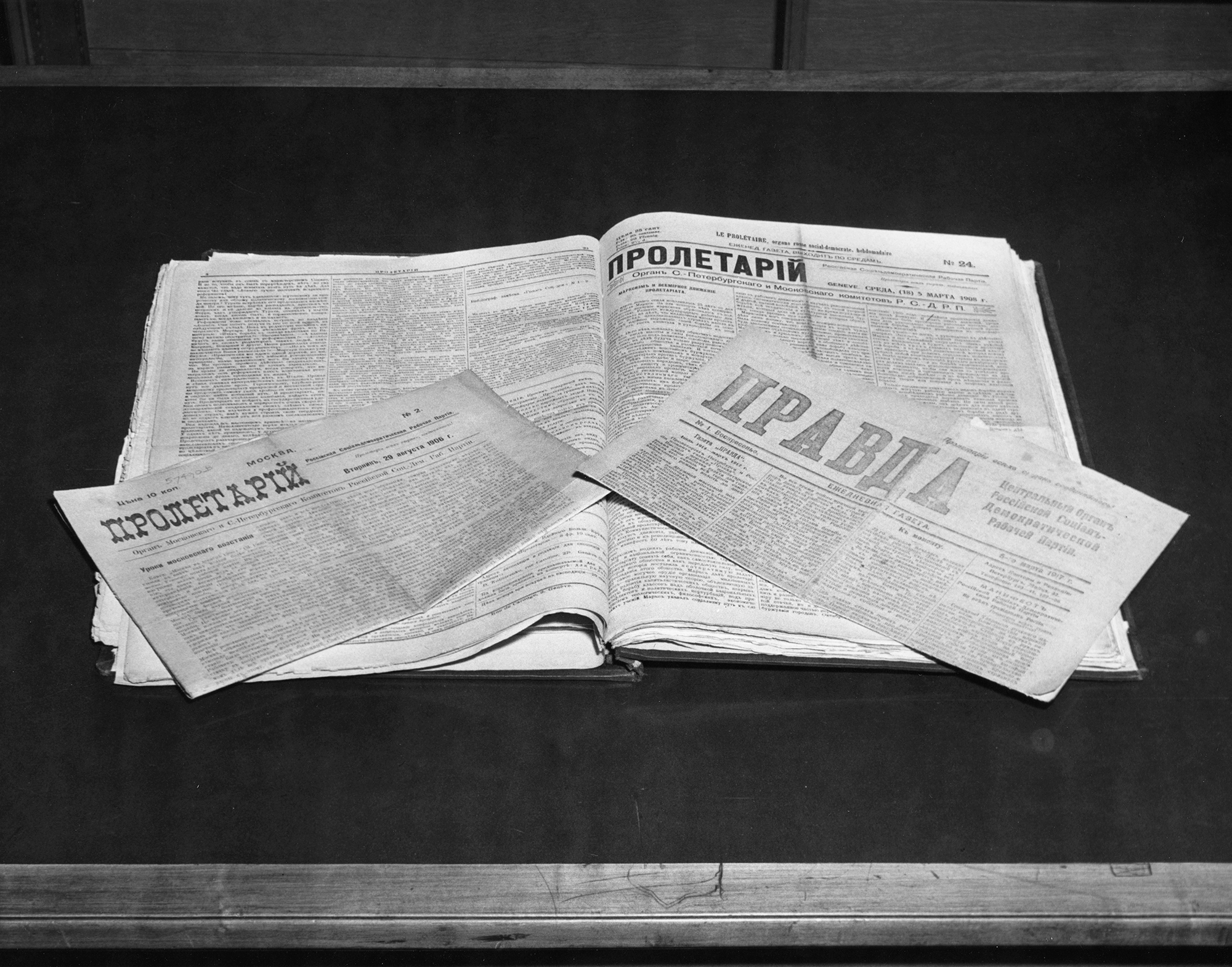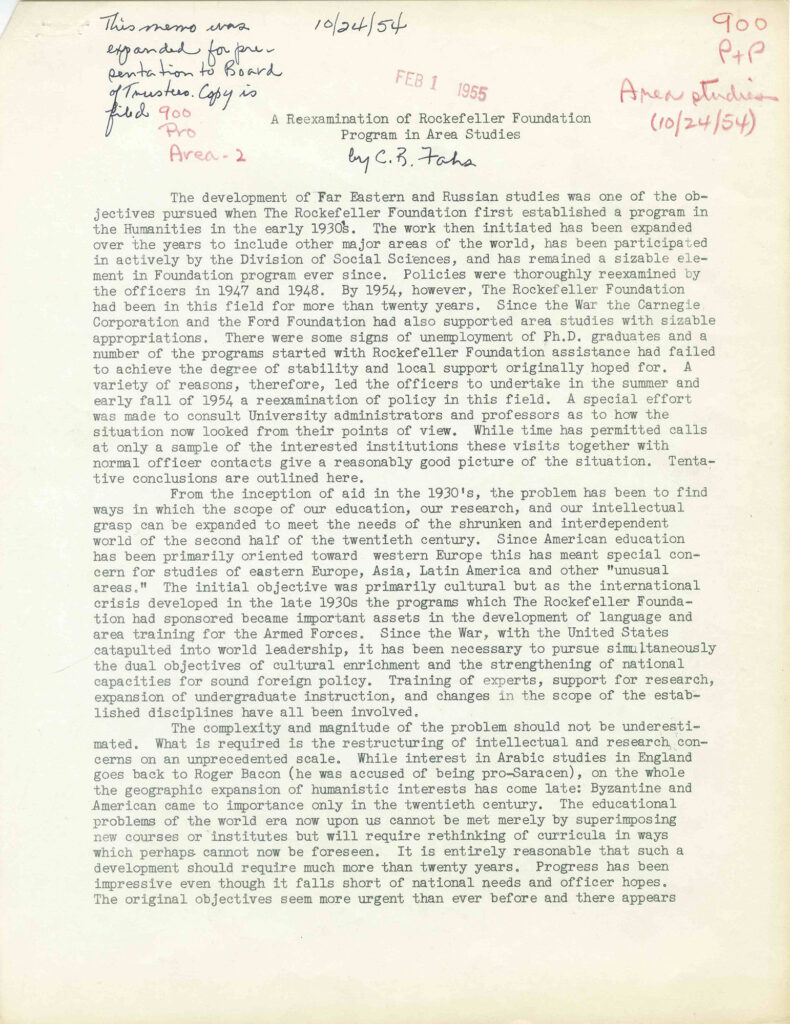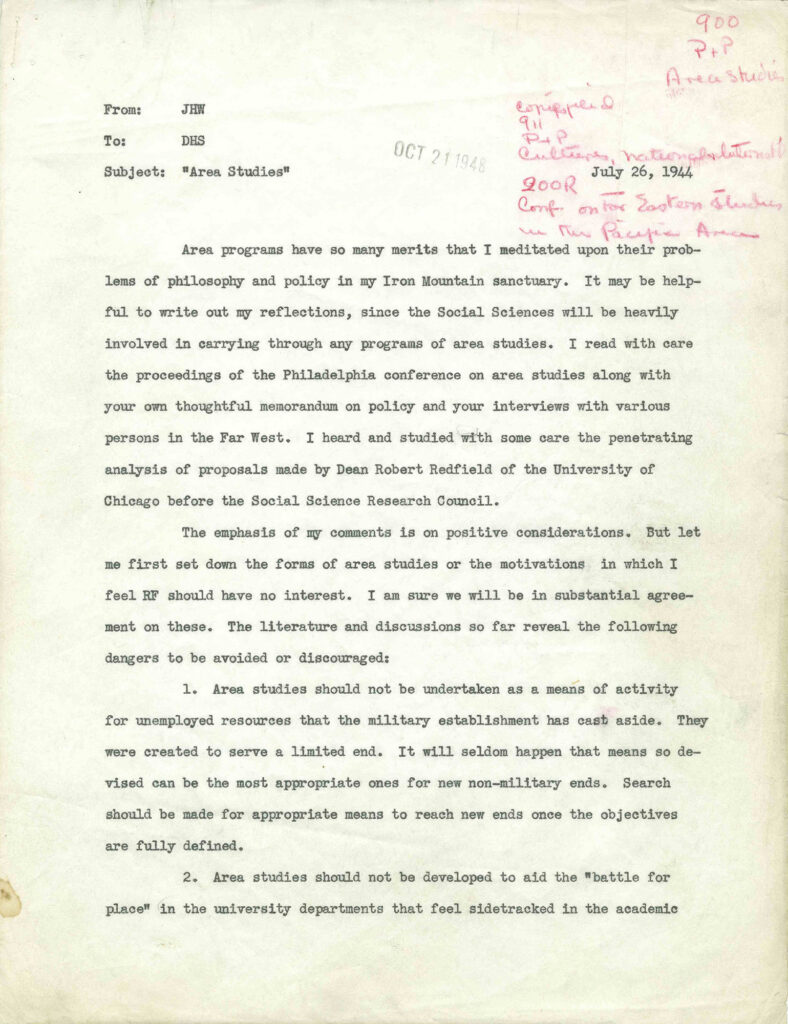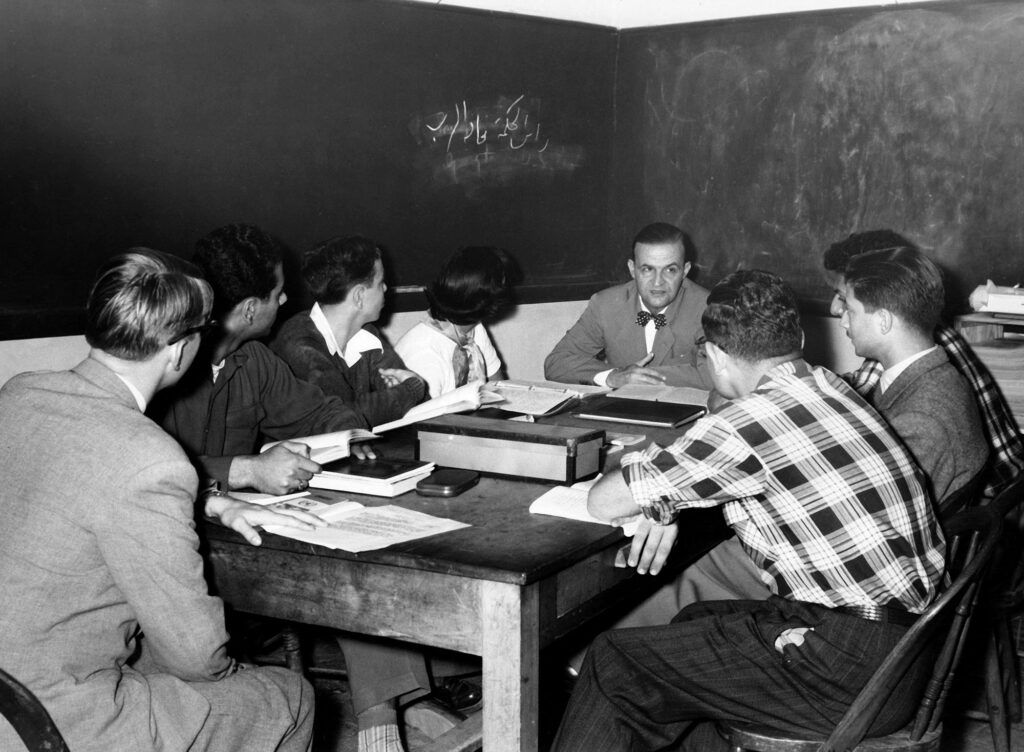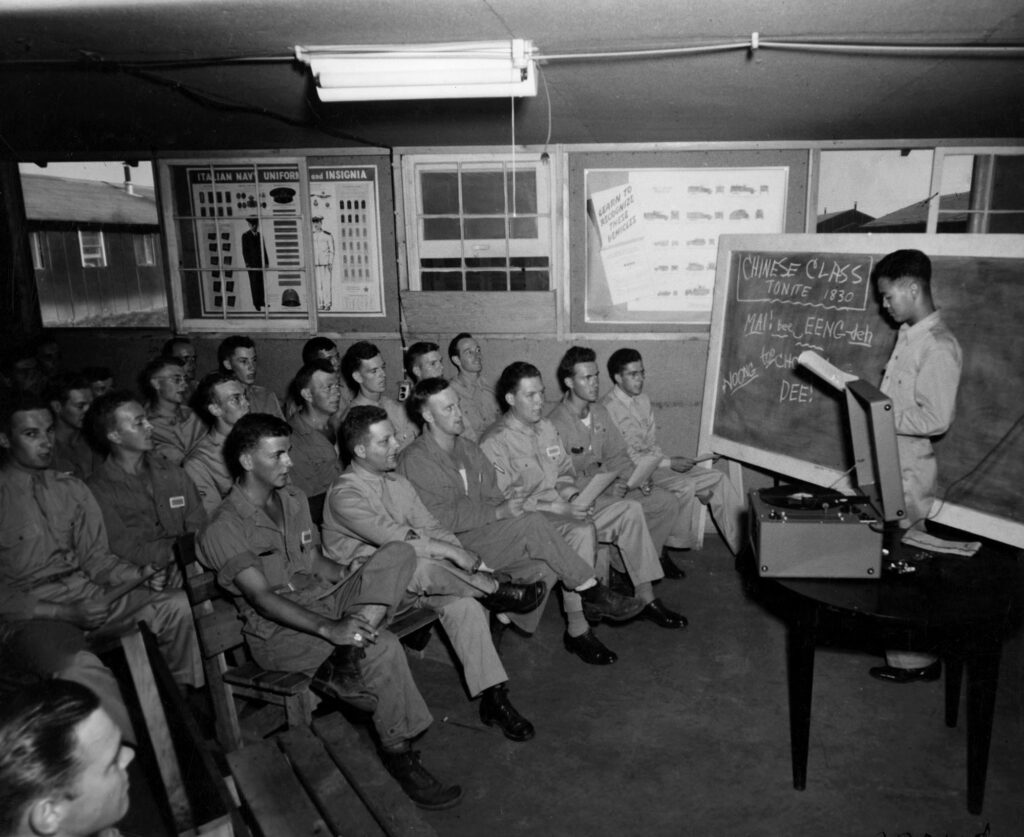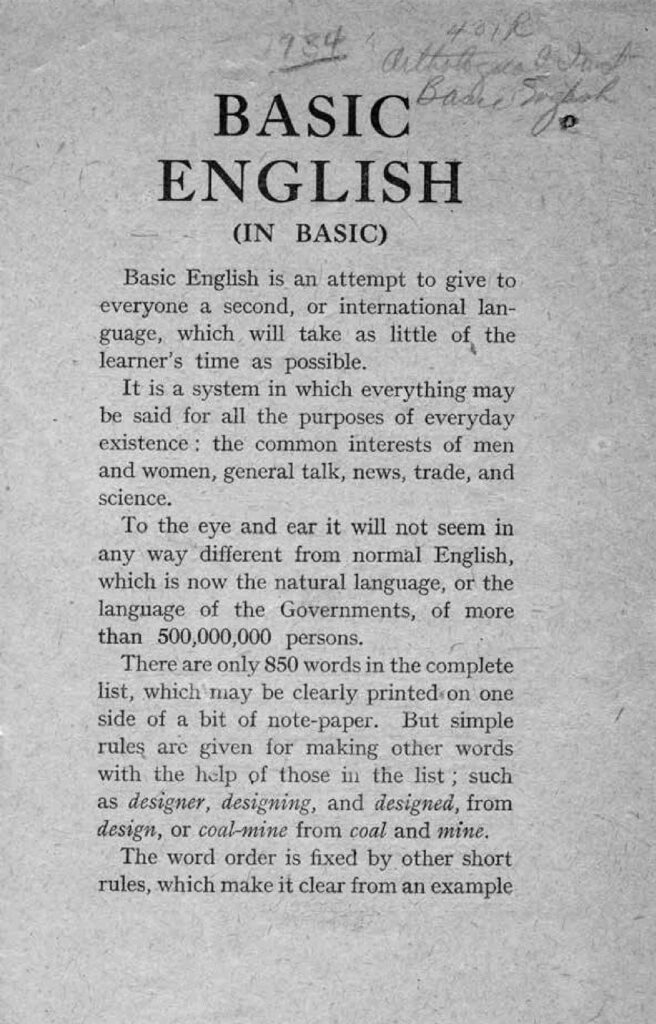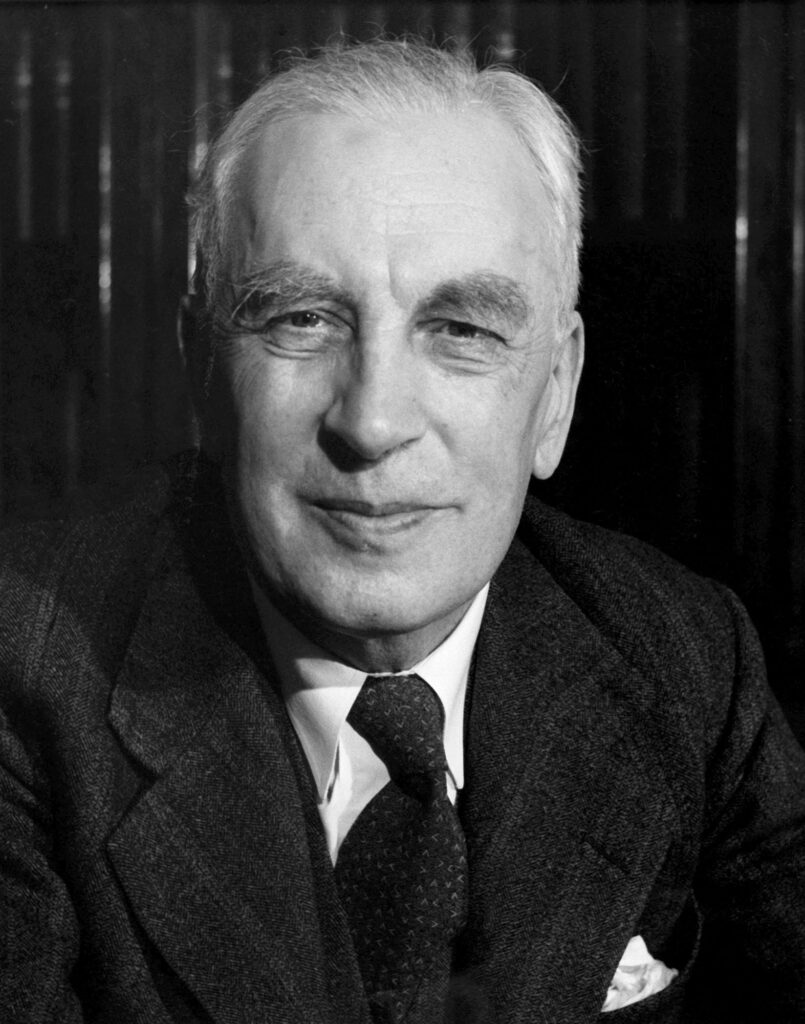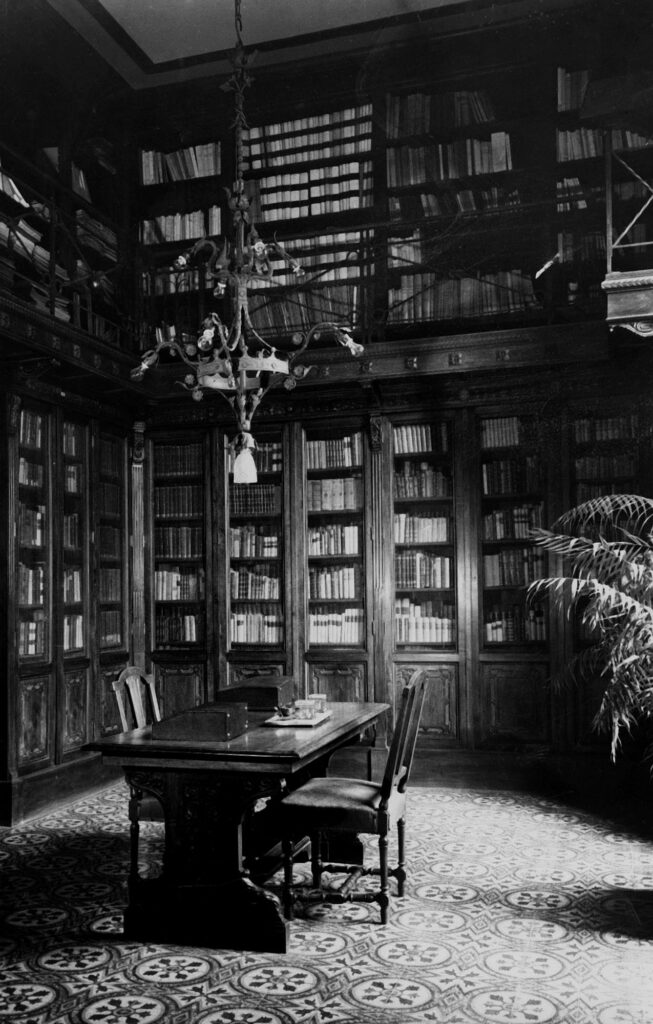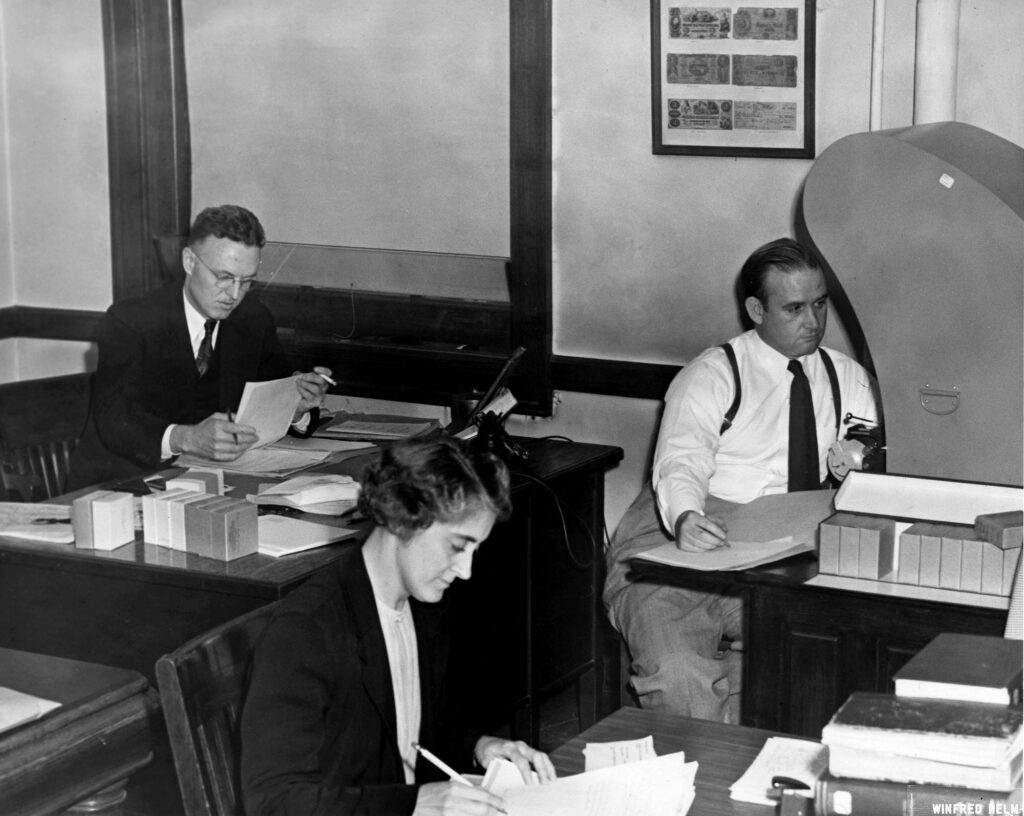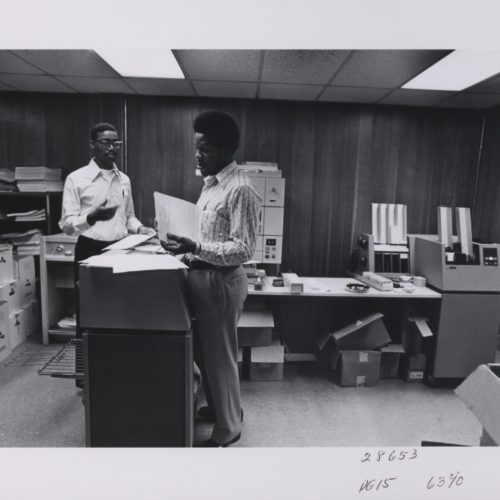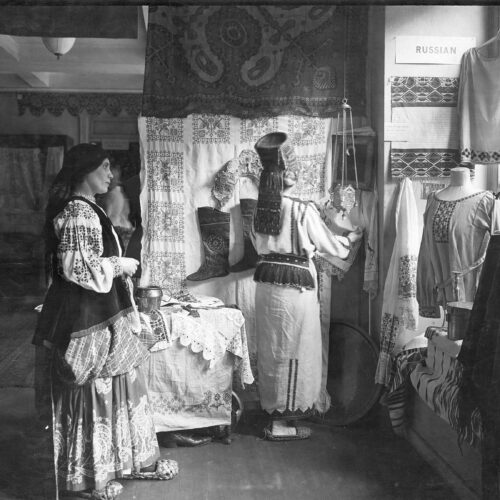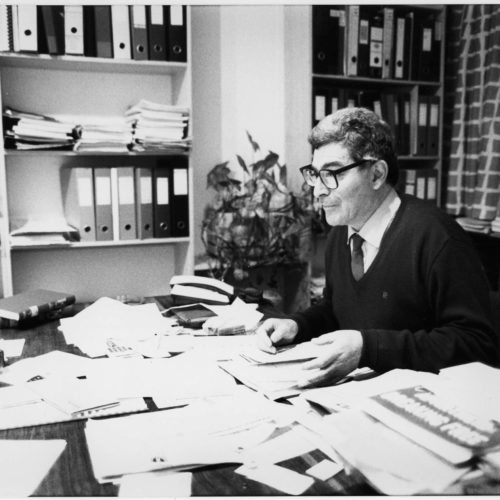Developing area studies programs at colleges and universities remains one of the Rockefeller Foundation’s (RF) lasting contributions to higher education. These interdisciplinary programs combined language training, geography, anthropology, history, economics and political science in a comprehensive approach to the study of world cultures.
The Rockefeller Foundation had long been instrumental in fostering the growth of academic departments in the humanities and social sciences. In the wake of World War II, however, it attempted to integrate existing departments in new ways. Carnegie Corporation of New York, the Ford Foundation, and the US government would also significantly support area studies, but the initial exploratory conversations began at the RF before the war had even ended. The first move was an exploratory conference convened by the RF in 1944, which brought together RF officers, representatives from Carnegie, university scholars, and “area men” with experience in wartime military training programs.
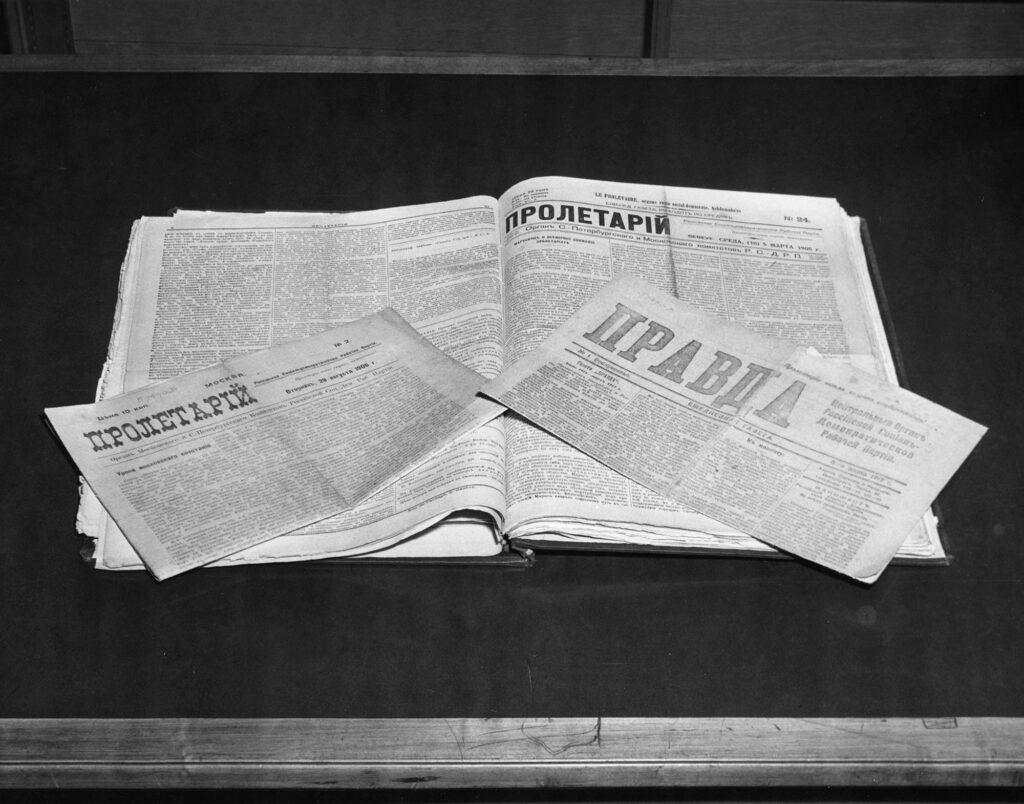
“The Shrunken and Interdependent World”
Area studies programs were designed to make university education more relevant to a changed world, and consequently strived to bridge pure scholarship and practical instruction. Schools that adopted area studies programs sought to increase undergraduate awareness of foreign cultures and to encourage academic research that would deepen international understanding.
At the same time, their graduate programs aimed to produce Ph.D.s to meet the government’s increasing demand for policy analysts, diplomats, and civil servants. As Charles B. Fahs, assistant director of the RF Humanities Division, explained,
[W]ith the United States catapulted into world leadership, it has been necessary to pursue simultaneously the dual objectives of cultural enrichment and the strengthening of national capacities for sound foreign policy.
Charles Fahs, 1954
Fahs believed this to be especially important in what he described as “the shrunken and interdependent world.”Charles B. Fahs, “A Reexamination of the Rockefeller Foundation Program in Area Studies,” October 24, 1954. Rockefeller Archive Center (RAC), RG 3.2, Series 900, Box 31, Folder 165.
The idea for area studies grew out of the Army Specialized Training Program (ASTP), which had used US land-grant universities to train specialists quickly for the war effort. RF funding had supported the development of language programs by the American Council of Learned Societies (ACLS) that proved readily adaptable to military training.
Similarly, the Foundation’s funding to the Social Science Research Council (SSRC) had enabled the wartime Ethnogeographic Board to assemble research portfolios on countries of engagement. As these programs wound down, the RF became interested in mobilizing these connections to support peacetime inquiry.
Beginning with Columbia University’s Russian Institute in 1946, the Foundation steadily underwrote the founding of programs in Eastern European, Asian, African and Latin American studies at US universities throughout the 1940s and 1950s. These programs offered a model for understanding cultures once marginal to US scholarship that were beginning to emerge as areas of global concern.
At the same time, the RF also supported American studies programs in the US and abroad, as well as international relations programs, all geared to respond to the transformations of postwar geopolitics. While the Ford Foundation would eventually take area studies to a larger scale in the 1960s, the initial programs were a coordinated effort by the RF and Carnegie to work with and reconfigure the strongest existing university centers.
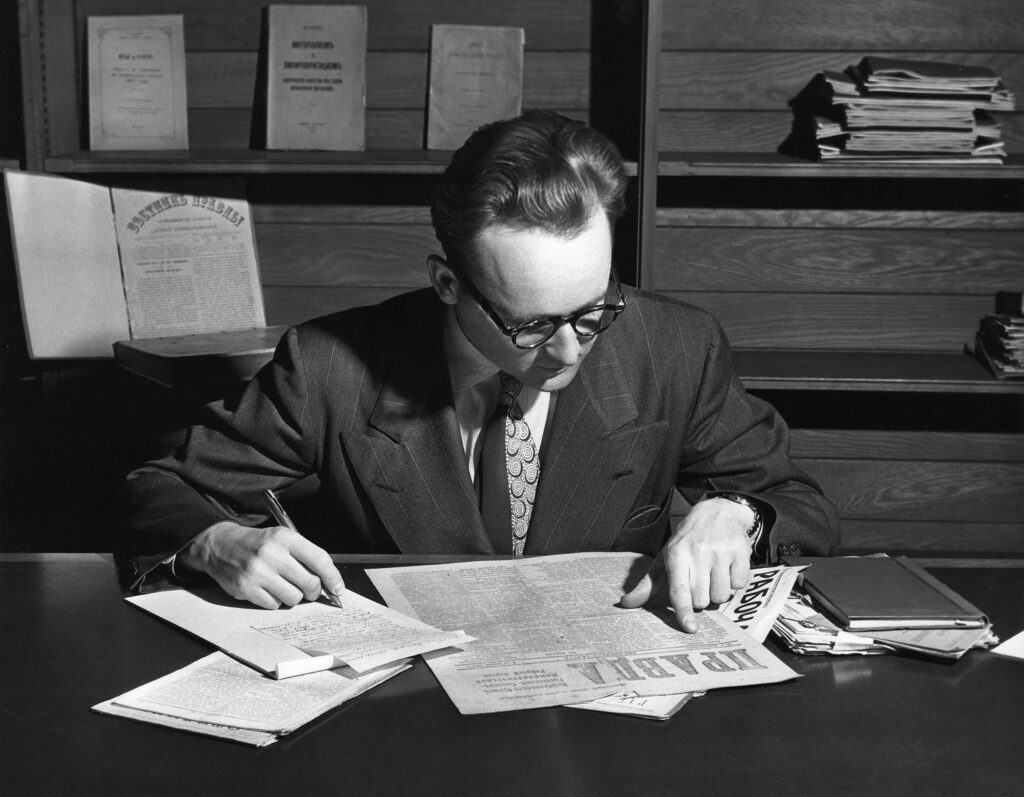
Restructuring Research Concerns
The Rockefeller Foundation’s success in establishing area studies programs stemmed from its earlier fostering of the social sciences and its encouragement for developing them as definable, rigorous, methodologically sound fields. This effort was launched by the Laura Spelman Rockefeller Memorial (LSRM) in the 1920s. and had come to fruition by the 1940s. The effects of the war, however, did shift the Foundation’s priorities away from “pure,” disinterested academic scholarship toward projects with an overt consideration of international relations. As RF President Chester Barnard quipped in 1950, “[O]rthodox disciplines are, I think, at present pretty defective bases for the analysis of concrete situations.”Memorandum by Chester Barnard, September 12, 1950, RAC, RG 3.2, Series 900, Box 31, Folder 165. Barnard’s administration (1948-1952) marked a new era within the Foundation characterized by direct engagement with the requirements of an increasingly interconnected, volatile, global politics.
Between 1946 and 1954 the RF spent over $8 million on area studies. In addition to Columbia’s Russian Studies Institute, signal US programs included Slavic studies at Stanford University, Far Eastern studies at the University of Washington, Near Eastern studies at Princeton University, and American regional studies at the University of Wisconsin-Madison.
Internationally, key programs included Latin American studies at the Colegio de Mexico in Mexico City, and Far Eastern studies at Leyden University in the Netherlands and and Stockholm University in Sweden. As the field matured, a second generation of programs included Far Eastern, Near Eastern, and Russian studies at Harvard University; Slavic studies at the Universities of Toronto and British Columbia; Chinese studies at Tokyo University; and Latin American studies at the University of Bordeaux. In addition, the RF funded undergraduate programs at Occidental College and Colgate University, and the East-West Center at the University of Hawaii.
…orthodox disciplines are, I think, at present pretty defective bases for the analysis of concrete situations.
Chester Barnard, 1950
Making Use of Experience
Within the Foundation, area studies provided an opportunity for the Humanities and Social Sciences Divisions to work together in an integrated way, fulfilling an ideal that program officers had strived for since the Foundation’s 1928 reorganization, but which had long been difficult to enact. In developing area studies, the two divisions pooled their extensive networks of university faculty and administrators, seeking those with expertise not only in a given discipline but also in a particular region, which at that time was an uncommon combination. This standard became especially important as a means of preventing area studies from substituting a shallow survey for serious academic rigor, which was a criticism frequently leveled at the new endeavor.
Officers and prominent scholars alike worried that the new approach might mistake a hodgepodge of facts for the deep expertise of the academic fields. Joseph H. Willits, director of the Foundation’s Division of Social Sciences, stressed research as a guarantee against superficiality, explaining that “without research, teaching will tend to emphasize spot information and travelogue reporting which does create interest at the elementary level, but which does not lead to disciplined thinking or mastery of other cultures equivalent to the familiarity we have of our own.”Joseph H. Willits to David H. Stevens, July 26, 1944, RAC, RG 3.2, Series 900, Box 31, Folder 165.
The Foundation’s emphasis on research fostered countless outstanding contributions to scholarship and foreign policy, much of which remains influential across a variety of disciplines today, for example George F. Kennan’s writings on the Soviet Union, produced at Columbia; anthropologist Clifford Geertz’s work on Indonesia, produced at Harvard; and Karl Wittfogel’s work in Chinese translation, produced at the University of Washington.
Despite the concern about superficiality as well as resistance by the established disciplines to the competition posed by these new programs, area studies persisted and prevailed in the 1950s and early 1960s. By and large, most of these programs and centers remain intact today. In many ways, area studies foreshadowed and encouraged the widespread adoption of interdisciplinary and multidisciplinary approaches that later became commonplace in universities from the the 1960s onwards.
Funding Language Learning
The Rockefeller Foundation’s work in the humanities was refocused in the early and mid-1930s toward a more “democratic and inclusive” direction, in the words of RF President Raymond Fosdick.The Rockefeller Foundation, Annual Report 1937 (New York: The Rockefeller Foundation, 1937) 50. (Link to PDF on Rockefeller Foundation Website) Communication, especially across diverse cultures, drove several Foundation initiatives. Program staff felt that language lies at the core of intercultural understanding. Thus, the teaching of languages assumed a prominent place in the portfolio of the Humanities Division, with particular attention paid to East Asia and Latin America. In time the Foundation’s interest in language would undergird its post-World War II area studies work.
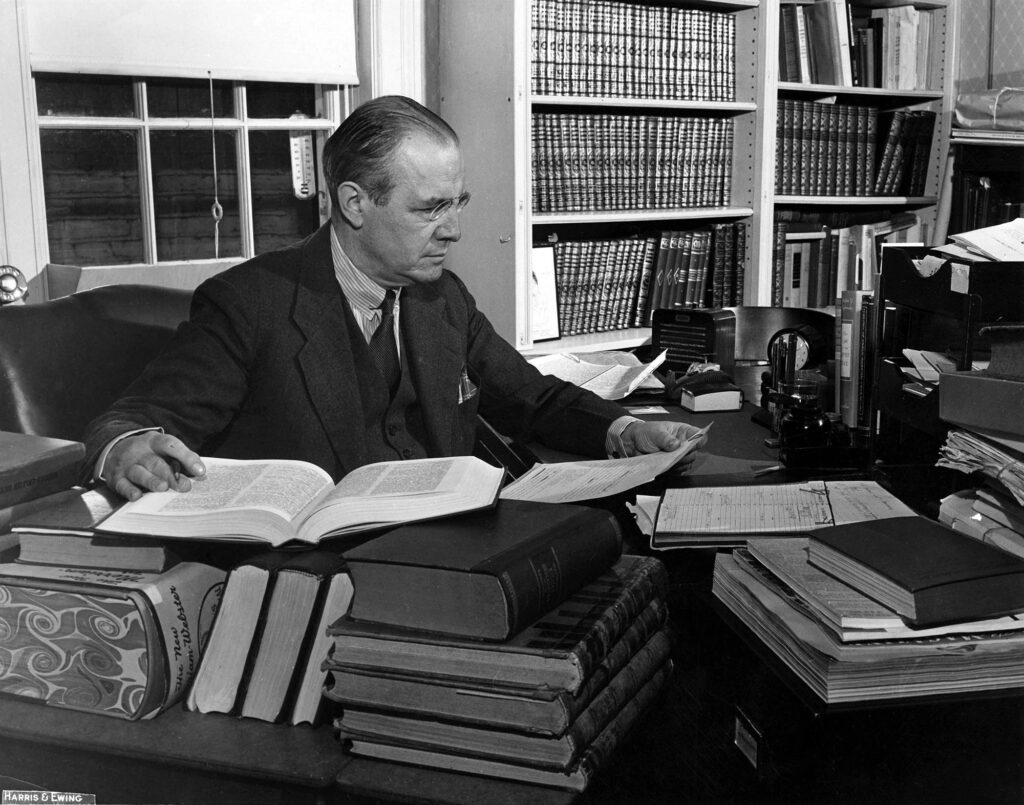
Looking East
In particular, Chinese and Japanese languages were rarely studied in the United States before the 1930s. With the American Council of Learned Societies (ACLS) taking a leading role, training in these languages was centered first at the Library of Congress and then fostered at summer institutes conducted at Harvard University, Columbia University, the University of California, Berkeley, and Cornell University. Russian was soon added to the roster of languages taught at these institutes and by 1939, Turkish and Arabic were also taught. On the eve of World War II, a dozen academic institutions were teaching at least one of these languages with funding from the Rockefeller Foundation.
Innovations in language instruction were fostered by these training programs and the Humanities Division’s support for basic linguistic research. Of particular interest were techniques that accelerated the pace of language learning. Having developed short, intensive courses in a number of languages, Rockefeller Foundation programs made a significant contribution to the US Army’s war effort. During the war, many essential languages, including Burmese, Persian, Malayan, and Tibetan, were taught using textbooks, dictionaries, and glossaries of technical terms created by Foundation initiatives.
Looking South to Latin America
Growing domestic attention to Latin America in the 1930s led to Foundation projects that ranged across many professional domains, from archaeology and anthropology to library and archival administration. Fellowships encouraged the exchange of graduate students and researchers among the countries of the Western hemisphere. Participants included teachers of both English and Spanish whose focus tended to be on new methods of teaching these languages (as well as the indigenous languages of the Americas).
The primary challenge of acquiring any new language as an instrument of intercultural communication was simplification. A Trustees Bulletin explained that
the task in each instance was that of stripping the language to its essentials, organizing these essentials in a logical system, and communicating the system to learners.The Rockefeller Foundation Trustees’ Monthly Bulletin, March, 1940, 4.
Foundation staff members eagerly embraced the work of I.A. Richards and C.K. Ogden of Cambridge University, whose research had led the two scholars to invent a system of teaching Basic English that relied on a vocabulary of merely 850 words and a simplified grammar.
Basic English
To Foundation program officers working in China, Basic English (or simply “Basic,” as they termed it) held promise as a means of drawing China into more active relationship with the West. Officers considered China linguistically isolated from the West and in many ways intellectually stagnant because of this isolation – advancements in Western science and social inquiry were rarely communicated in or translated into Chinese. I.A. Richards’s Orthological Institute of China launched a Basic English campaign in northern China. In hindsight, its experimental approach had some far-fetched features, including efforts to translate literary works by Jonathan Swift and George Bernard Shaw into Basic English, along with poster campaigns and loudspeakers blaring English lessons in urban streets and rural villages. The program had mixed results, but the Japanese invasion of China in 1937 ended its efforts.
Importantly, Foundation staff never viewed communication as a one-way street. Although English was widely considered the language of international exchange, RF officers recognized the need for Americans to master other languages, even obscure ones. In the 1930s and 1940s, RF grantees engineered many improvements in language teaching and expanded the range of languages that Americans could learn. This work laid a strong foundation for the post-war commitment of the RF and other foundations to area studies.
Language and Our Schools
In more recent decades, the Foundation’s funding for language studies continued with its grants for translation projects, and support for initiatives at the Modern Language Association, the ACLS and other professional associations, and academic institutions. In the early 1980s, following the publication of “The Humanities in American Life,” a Foundation-sponsored commission report which urged attention to humanities instruction in the schools, RF officers launched the Rockefeller Foundation Fellowships for Foreign Language Teachers in the High Schools.
For a decade, a hundred middle and high school teachers were competitively chosen annually for a summer of study or travel of their own design. School and community projects building on their experiences were to follow. The program was intended to showcase the importance of the teaching profession as well as to improve their classroom work.
Funding the Study of History
While the discipline of history never received the level of support enjoyed by archaeology and classical studies in the 1930s, the work of historians proved useful to the Rockefeller Foundation beginning in the 1950s. Both the Humanities Division and the Social Sciences Division supported leading historians as part of their commitments to intercultural studies, international relations, and area studies. History became an important tool in the postwar years as the Foundation tried to understand “the processes by which our attitudes, beliefs and value judgments are developed, made more coherent and integrated into a harmonious pattern.”The Rockefeller Foundation, Annual Report 1951 (New York: The Rockefeller Foundation, 1951) 86. (Link to PDF on Rockefeller Foundation Website) By one rough estimate, the Foundation spent $7 million on historical research between 1950 and 1960.
A Cloistered Field
While the Humanities Division in the 1950s counted several trained historians among its officers, they were often critical of the work being produced by historians in academia. The work emanating from university departments seemed insular, the topics too narrow, and the published writings unlikely to engage a wider public. Charles B. Fahs argued that
[T]he social value of history and the justification for our concern with it, depends on reaching consumers beyond the historical profession. History which has no effect beyond the limited circle of historians has no place in RF programs however interesting, learned, novel, monumental or definitive it may be.Memorandum from Charles B. Fahs to Chester I. Barnard, February 1, 1950, Rockefeller Archive Center (RAC), RG 3, Series 911, Box 1, Folder 5.
Fahs thought the entire historical profession was moving aimlessly, likening it to an army advancing over terrain without a strategy, a map, or a commanding general. His critique became the Foundation’s starting point for supporting historians whose research would illuminate contemporary problems and whose writings would have popular appeal. Between 1950 and 1960, RF focused its resources on interpretive histories that examined world history, contemporary twentieth-century history, and histories of the non-Western world.
Expanding Perspectives
In 1960, Fahs wrote:
Histories of individual countries are not enough to provide the broad vision and orientation which the present world situation –and that for the foreseeable future –demands. We also need a general framework of world history which can help the intelligent layman to see all nations as parts of an interrelated whole.“Humanities Program and Related Foundation Interests in History, 1950-1960” by Charles B. Fahs, November 16, 1960, RAC, RG 3, Series 911, Box 3, Folder 18.
With this ambition in mind, RF officers set out to find projects worthy of funding. Finding capable scholars willing to undertake comprehensive and comparative world histories with sweeping perspectives on the driving forces underlying historical change proved more difficult than the program officers anticipated. Historians the Foundation did support included Geoffrey Barraclough, Ralph Turner, Fernand Braudel, and Arnold Toynbee.
Toynbee, director of studies at the Royal Institute of International Affairs in England, received support from both the Social Sciences Division and the Humanities Division. They were familiar with his work on the decline of empires and civilizations, the first volumes of which were published in the mid-1930s. They supported him while he completed and revised his sweeping multi-volume work, A Study of History. As the Foundation no doubt hoped, his work attained a substantial popular following, but it was widely criticized by historians as simplistic and naively moralistic. While Fahs echoed some of the criticisms, he also stood by Toynbee, writing,
It is easy to criticize Toynbee–I do not like his cyclical and religious interpretations…but I wish we had more historians who had the courage to make such efforts.“The Humanities and ‘The Well-Being of Mankind’: The Humanities at the Rockefeller Foundation Since 1928 by Joel Colton and Malcolm Richardson, 1982.
Contributing to Contemporary Thought
Many of the grants in contemporary history sought to improve understanding of the rise of fascism and World War II. Foundation efforts also built historical research institutions in Europe and helped to reestablish academic freedom where it had been suppressed prior to the war. Notable grants included those to the Institut für Zeitgeschichte in Munich and the New School for Social Research in New York for studies related to the rise of Hitler, German militarism and modern German culture. Meanwhile, as Italy flirted with Communism in the postwar period, grants were also provided to the Italian Institute of Historical Studies, a locus for non-Marxian approaches to history.
In part, the motivation behind RF support for contemporary twentieth-century history was the desire to understand more deeply the post-war world. The changes wrought by war and by the scientific developments that the war had accelerated touched many fields of RF interest. Indeed, RF bore a measure of responsibility for some of these changes. It had helped to revolutionize public health and agriculture, thus fostering an increase in global population; it had supported scientific research, including work on the atomic bomb, that brought new moral questions to the fore; and its work in mass communications had helped to shrink the globe, bringing diverse cultures into more immediate contact.
RF’s support for those studying the history of the contemporary world was part of its struggle to understand the world that it had helped to shape and in which it wanted to continue to operate. Fahs reflected a utilitarian view of historical research, writing to RF President Chester I. Barnard, “The significance of historical writing lies in its relevance to contemporary problems, the contribution which it can make to contemporary thought, not in the importance of an event at the time it occurred.”Memorandum from Charles B. Fahs to Chester I. Barnard, February 1, 1950, RAC, RG 3, Series 911, Box 1, Folder 5.
Exploring the Non-Western World
In 1960 Fahs characterized non-Western histories as “the most important aspect of our program in history.”“Humanities Program and Related Foundation Interests in History, 1950-1960” by Charles B. Fahs, November 16, 1960, RAC, RG 3, Series 911, Box 3, Folder 18. Its importance had grown with the rise of postcolonial, nationalist movements and was especially important to those working at RF at the very time the Foundation was expanding its agricultural, public health and other endeavors in Latin America, Asia, and Africa. The Foundation funded historians in India to study contemporary Indian politics and culture; it supported work on contemporary Islam at McGill University’s Institute of Islamic Studies; and it encouraged the work of Daniel Cosio-Villegas at the Colegio de Mexico.
Fahs was often critical of the work western scholars had done in developing regions. Not mincing words, he explained, “Western-oriented history is a source of stupidity and arrogance in the West, but in Asia and Africa it is a source of more dangerous feelings of alienation, rootlessness and inferiority.”“The Humanities and ‘The Well-Being of Mankind’: The Humanities at the Rockefeller Foundation Since 1928 by Joel Colton and Malcolm Richardson, 1982, p.23.
The effort to understand nations emerging from colonial rule was supported by both the Humanities and Social Science Divisions. It provided the underpinning for much of the work in area studies. Both divisions contributed to new programs, including Middle Eastern Studies at Harvard and Princeton Universities, Southeast Asian Studies at Cornell University and Eastern European Studies at Oxford University.
The Sources of History
Foundation staff in the Humantities and Social Sciences divisions had been interested in the history of the United States since the 1930s. The Foundation had also promoted American Studies in other countries since the end of World War II.
Beginning in the late 1940s, Foundation programs began to emphasize the accessibility of primary sources for the study of American history. In the absence of significant government funding for editing and publishing projects, the RF began to support several important editorial efforts. Between 1947 and 1952, the Foundation provided $54,000 to the Abraham Lincoln Association for the publication of Lincoln’s collected writings. Similar grants followed, including funding to the University of Chicago to publish the James Madison papers and to the Woodrow Wilson Foundation for the publication of Wilson’s papers. Other publishing projects for editions of the papers of Alexander Hamilton, Alexis de Tocqueville, and the Marquis de Lafayette also received support.
Finally, while never a major focus area of its funding, the Rockefeller Foundation provided selective funding for the research and publication of biographies. A number of significant biographies were supported, including Marquis James’ biography of Booker T. Washington, Frank Freidel’s biography of Franklin D. Roosevelt, and Dumas Malone’s six-volume biography of Thomas Jefferson.
Revising a Program
In 1974, the trustees called for a renewed interest in the humanities. Once again, Foundation leadership looked for ways in which history could be used to inform the present, noting,
The Foundation’s fundamental objective…is to associate the humanities with deep human concerns and to help illuminate the values of contemporary society.The Rockefeller Foundation, Annual Report 1976 (New York: The Rockefeller Foundation, 1976) 70. (Link to PDF on Rockefeller Foundation Website)
Foundation staff sought scholars and projects aiming to understand the diverse cultural heritage of Americans. Funding went to projects with a national scope, such as the Harvard Ethnic Encyclopedia, and more localized projects, such as the Arkansas Folklore Education Consortium.
The Foundation continued to widen the potential audience for work in the humanities by supporting the field of public history. It also gave funding to programs seeking to capture the stories of minority and less well-researched populations through oral history projects. The 1974 Annual Report describes the role that history would play for the Foundation in the future:
With encouragement to be broader in their sympathies and outlook, scholars can enrich our understanding of our nationhood, draw upon overlooked cultural resources, and enhance the country’s pride in its diversity as well as its unity.The Rockefeller Foundation, Annual Report 1974 (New York: The Rockefeller Foundation, 1974) 90. (Link to PDF on Rockefeller Foundation Website)
Research This Topic in the Archives
Explore this topic by viewing records, many of which are digitized, through our online archival discovery system.
- “Program and Policy – Area Studies,” 1944, 1946-1951, 1954-1955, 1957, 1959, 1961. Rockefeller Foundation records, Administration, Program and Policy, Record Group 3, Subgroup 3.2, General Program and Policy, Series 900, Rockefeller Archive Center.
- “Program and Policy – Area Studies – Reports – Pro Area-1 – Pro Area-2,” 1950-1954. Rockefeller Foundation records, Administration, Program and Policy, Record Group 3, Subgroup 3.2, General Program and Policy, Series 900, Rockefeller Archive Center.
- “Colombia University – Russian Institute,” 1944-1950. Rockefeller Foundation records, Projects (Grants), Record Group 1, Subgroup 1.1, United States, Series 200, Social Sciences, Subseries 200.S, Rockefeller Archive Center.
- “Orthological Institute – Basic English,” 1930-1957. Rockefeller Foundation records, Projects (Grants), Record Group 1, Subgroup 1.1, England, Series 401, Humanities and Arts, Subseries 401.R, Rockefeller Archive Center.
- “Orthological Institute – Basic English – Reports and Pamphlets,” 1930-1940. Rockefeller Foundation records, Projects (Grants), Record Group 1, Subgroup 1.1, England, Series 401, Humanities and Arts, Subseries 401.R, Rockefeller Archive Center.
- “American Council of Learned Societies – Modern Languages,” 1941-1949. Rockefeller Foundation records, Projects (Grants), Record Group 1, Subgroup 1.1, United States, Series 200, Humanities and Arts, Subseries 200.R, Rockefeller Archive Center.
- “American Council of Learned Societies – Modern Languages – Report,” 1945. Rockefeller Foundation Records, Projects (Grants), Record Group 1, Subgroup 1.1, Series 200.R, Rockefeller Archive Center.
- “Cornell University – Russian Studies,” 1943 June – 1959. Rockefeller Foundation records, Projects (Grants), Record Group 1, Subgroup 1.1, United States, Series 200, Humanities and Arts, Subseries 200.R, Rockefeller Archive Center.
- “Princeton University – Arabic and Islamic Studies – Reports,” 1942-1944. Rockefeller Foundation records, Projects (Grants), Record Group 1, Subgroup 1.1, United States, Series 200, Humanities and Arts, Subseries 200.R, Rockefeller Archive Center.
- “Malone, Dumas – (University of Virginia, Jefferson Biography,” 1944-1950. Rockefeller Foundation records, Projects (Grants), Record Group 1, Subgroup 1.1, United States, Series 200, Humanities and Arts, Subseries 200.R, Rockefeller Archive Center.
- “Colegio De Mexico – Mexican History,” 1947-1954. Rockefeller Foundation records, Projects (Grants), Record Group 1, Subgroup 1.2, Mexico, Series 323, Humanities and Arts, Subseries 323.R, Rockefeller Archive Center.
- “Italian Institute of Historical Studies,” 1948-1953. Rockefeller Foundation records, Projects (Grants), Record Group 1, Subgroup 1.2, Italy, Series 751, Humanities and Arts, Subseries 751.R, Rockefeller Archive Center.
- “Program and Policy,” 1915-1959. Rockefeller Foundation records, Administration, Program and Policy, Record Group 3, Subgroup 3.1, Humanities, Series 911, Rockefeller Archive Center.
- “Program and Policy – Reports – Pro-24 – Pro 25a, b,” 1959-1960. Rockefeller Foundation records, Administration, Program and Policy, Record Group 3, Subgroup 3.1, Humanities, Series 911, Rockefeller Archive Center.
- “Investigations,” 1951-1955, 1957-1958, 1961-1964, 1967-1970. Rockefeller Foundation records, Administration, Program and Policy, Record Group 3, Subgroup 3.1, General Program and Policy, Series 900, Rockefeller Archive Center.
- “Royal Institute of International Affairs – Toynbee, Arnold J.,” 1951 – May; 1952. Rockefeller Foundation records, Projects (Grants), Record Group 1, Subgroup 1.2, England, Series 401, Humanities and Arts, Subseries 401.R, Rockefeller Archive Center.
- “Royal Institute of International Affairs – Toynbee, Arnold J.,” June 1952 – August 1955. Rockefeller Foundation records, Projects (Grants), Record Group 1, Subgroup 1.2, England, Series 401, Humanities and Arts, Subseries 401.R, Rockefeller Archive Center.
- “University of Chicago – Madison Papers – (Publication),” 1955-1958. Rockefeller Foundation records, Projects (Grants), Record Group 1, Subgroup 1.2, United States, Series 200, Humanities and Arts, Subseries 200.R, Rockefeller Archive Center.
- “Abraham Lincoln Association – (Lincoln Papers Publication),” 1947-1954. Rockefeller Foundation records, Projects (Grants), Record Group 1, Subgroup 1.2, United States, Series 200, Humanities and Arts, Subseries 200.R, Rockefeller Archive Center.
- “Speeches, Articles, and Thought Pieces – Rockefeller Foundation (A-Humanities),” 1925-1980. John Marshall papers, General Files, Series 1, Rockefeller Archive Center.
- “Abraham Lincoln Association” circa 1905-1980. Rockefeller Foundation records, Photographs, United States, Series 200, Humanities and Arts, Subseries 200.R, Rockefeller Archive Center.
- “American Council of Learned Societies – Modern Language” circa 1905-1980. Rockefeller Foundation records, Photographs, United States, Series 200, Humanities and Arts, Subseries 200.R, Rockefeller Archive Center.
- “World Wide Broadcasting Foundation” circa 1905-1980. Rockefeller Foundation records, Photographs, United States, Series 200, Humanities and Arts, Subseries 200.R, Rockefeller Archive Center.
- “Columbia University – Russian Institute” 1944-1950. Rockefeller Foundation records, Photographs, United States, Series 200, Social Sciences, Subseries 200.S, Rockefeller Archive Center.
- “Instituto Italiano di Studi Storici – Italian Institute of Historical Studies” circa 1905-1980. Rockefeller Foundation records, Photographs, Italy, Series 751, Humanities and Arts, Subseries 751.R, Rockefeller Archive Center.
- “American University of Beirut – Arabic Studies” circa 1905-1980. Rockefeller Foundation records, Photographs, Syria (Lebanon), Series 833, Humanities and Arts, Subseries 833.R, Rockefeller Archive Center.
- Joel Colton and Malcolm Richardson, The Humanities and “The Well-Being of Mankind”: The Humanities at the Rockefeller Foundation Since 1928.
The Rockefeller Archive Center originally published this content in 2013 as part of an online exhibit called 100 Years: The Rockefeller Foundation (later retitled The Rockefeller Foundation. A Digital History). It was migrated to its current home on RE:source in 2022.
